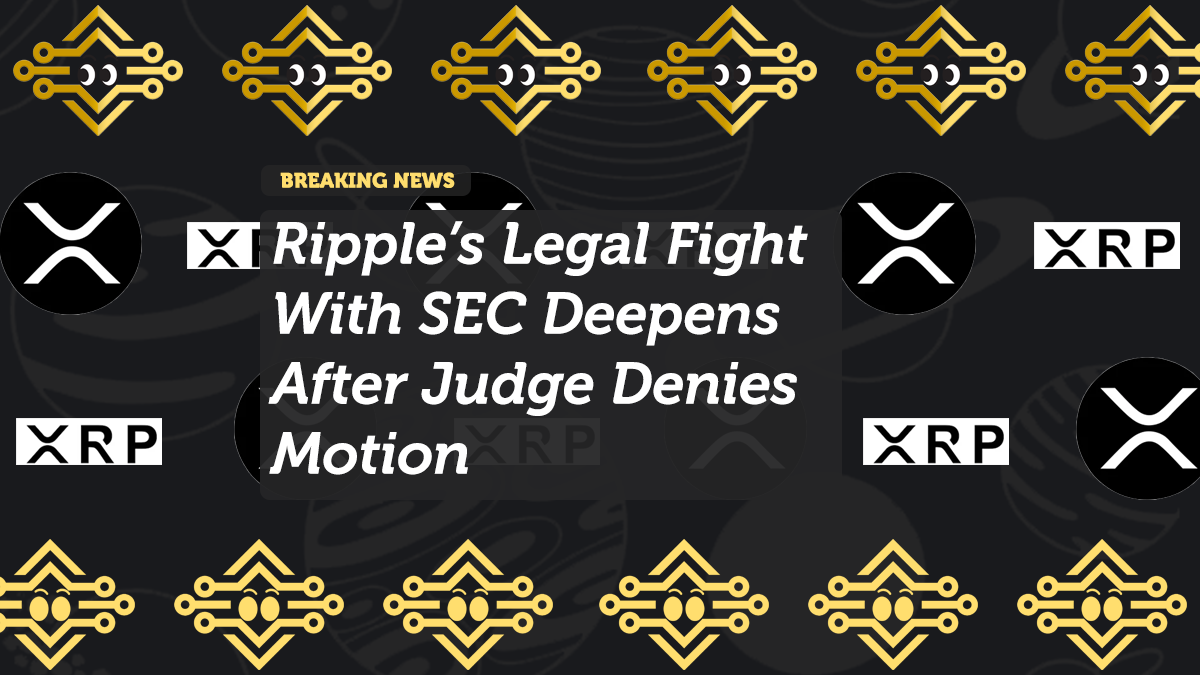
Ripple’s Legal Fight With SEC Deepens After Judge Denies Motion
Ripple’s courtroom standoff with the U.S. Securities and Exchange Commission (SEC) just took another dramatic turn—and not in Ripple’s favor. On June 25, a U.S. federal judge denied Ripple’s motion to dismiss key elements of the SEC’s lawsuit, signaling that the case is far from over.
Despite a partial win last year regarding XRP’s classification, Ripple now finds itself heading into a more complicated legal phase. So what does this latest decision mean for Ripple, XRP, and the broader crypto market?
Judge Denies Ripple’s Motion to Dismiss
In a ruling that rippled across the crypto world, Judge Analisa Torres denied Ripple’s motion to dismiss the SEC’s claims related to institutional sales of XRP. Ripple had argued that these sales did not constitute securities offerings under U.S. law, citing the July 2023 ruling that declared XRP not a security when sold on public exchanges.
But the judge disagreed—at least for now.
“The court finds that factual disputes remain regarding Ripple’s institutional sales and promotional efforts,” the decision read.
In plain terms, this means the court isn’t ready to throw out the SEC’s charges just yet.
What Does This Mean for XRP?
The immediate market response was mixed. XRP saw a modest pullback following the news, but it avoided the kind of nosedive seen during earlier legal blows. Many investors are already hardened to Ripple’s years-long legal drama, but the decision does cloud the near-term picture.
If institutional XRP sales are ultimately ruled to be unregistered securities offerings, Ripple could face serious financial penalties—or even operational constraints on future sales.
Why This Case Still Matters
This case isn’t just about Ripple or XRP—it’s seen as a bellwether for how U.S. regulators might treat crypto tokens and blockchain-based fundraising models in general. The SEC has argued that most crypto assets are securities and should fall under its regulatory umbrella.
Ripple, on the other hand, claims the SEC is applying outdated laws to innovative technology, stifling American innovation in the process.
A final decision in this case could influence:
- How other crypto projects structure their token sales
- Whether future XRP ETFs gain regulatory approval
- How Congress shapes crypto legislation in response to judicial outcomes
Ripple’s Defense: It’s Not Over Yet
Ripple’s legal team responded swiftly, emphasizing that the denial of the motion doesn’t amount to a loss—it simply means the case continues. In fact, Ripple has won significant ground before.
Last year, Judge Torres ruled that programmatic sales of XRP on exchanges were not securities, which was hailed as a major victory. Ripple is now expected to focus its defense on the differences between institutional and retail XRP transactions.
Brad Garlinghouse, Ripple’s CEO, has also reiterated that the company is committed to fighting for clarity, not just for Ripple, but for the entire crypto industry.
What’s Next?
The next phase of the trial may involve:
- Further discovery around Ripple’s institutional sales
- Possible settlement negotiations
- A jury trial, if both sides fail to resolve the outstanding issues
Meanwhile, crypto watchers are also closely tracking developments in Congress, where new stablecoin and crypto market structure bills could eventually render lawsuits like this one moot.
Final Thoughts
While the denial of Ripple’s motion is a setback, it’s not the final word. Ripple remains determined to see the fight through, and the case continues to be one of the most important legal battles in crypto history.
Whether you’re a trader, developer, or simply an enthusiast, this case will likely shape how crypto is regulated for years to come.










